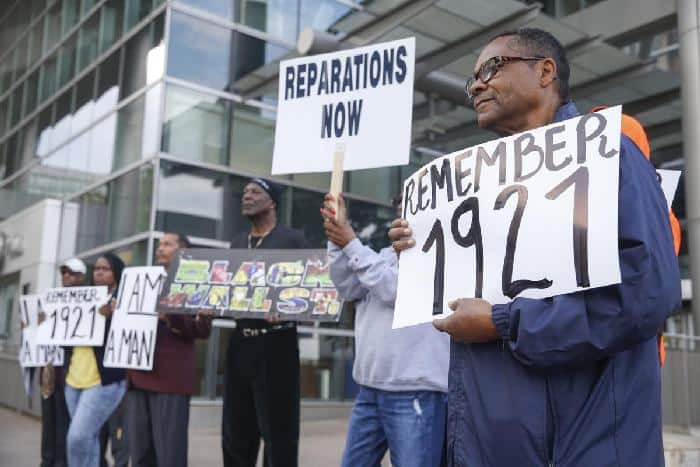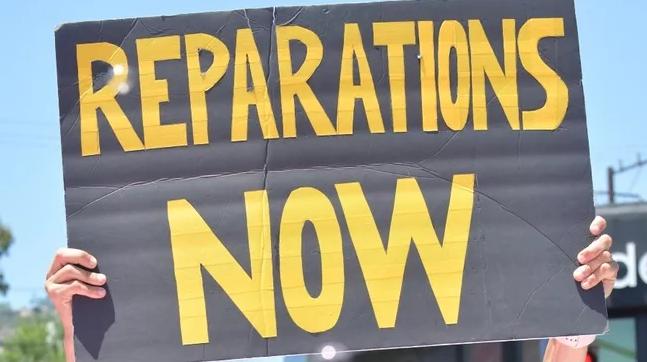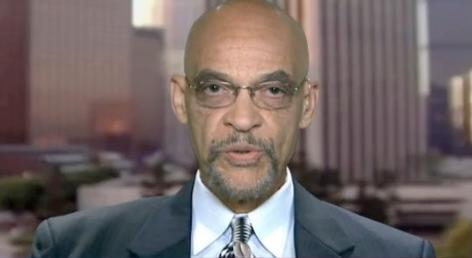
*Tulsa County District Judge Caroline Wall on May 1 did something that the handful of living survivors of the Tulsa Massacre of 1921 thought they’d never hear. She ruled in a packed courtroom that the lawsuit for reparations for the survivors of the massacre could go forward. The Tulsa massacre is certainly aptly named. For days, a white mob engaged in a colossal orgy of murder, rape, burning, and looting of the thriving Black business and financial section of Tulsa Oklahoma. It was as near a planned, orchestrated, racial pogrom as America would ever witness. When the smoke cleared hundreds were dead, and millions in property was lost.
There have been countless articles, books, and stories recounting the racial horror and the stories of the dwindling number of survivors. There has even been an apology from the state of Oklahoma. However, in the century-plus since the grotesque quasi genocide assault, not a penny has been shelled out to the survivors as reparations.
Judge Wall’s decision held out that faint possibility. Her decision also reopened the bigger issue of reparations for slavery. This has been one of the most hotly debated, contentious issues since former Michigan Congressman John Conyers introduced the first reparations bill in Congress in the 1970s.
Since then, there have been countless studies, reports, news articles, endless debates, and a House commission to study the feasibility of reparations.
MORE NEWS ON EURWEB: EURVideoNews: California Ties Reparations to Lineage (Descendants of Slaves) | WATCH

During this same period payments have been made to Japanese Americans various American Indian groups, and other affected individuals and groups for past injustices. Yet not one penny has been allocated for reparations in any form for African Americans.
Why is that? The easy answer is that there have been so many proposals put forth how reparations could be made, for what and to whom, that the issue has been hopelessly entangled. There’s truth to that. But that’s too easy. Reparations is a tough sell, and it has little to do with hard dollars.
The tip is the Democrats. Every 2020 Democratic presidential candidate signed onto to the House measure to establish a reparations feasibility commission. Before top Democrats signed on to the commission, the demand for reparations was mostly viewed as a fringe issue touted by a motley mix of black separatists, zealots, and crackpots and that respected mainstream civil rights leaders shunned. That has changed.
But now what? Biden has not pushed the issue. He does not dare talk the need for slavery reparations to rural, blue-collar, less educated white voters in the coming midterms elections. These are the voters who did much to put Trump in the Oval Office in 2016. Biden and VP Kamala Harris will stay mum on the issue. There’s a good reason.

Every poll that has been taken on reparations for slavery has repeatedly shown that most whites oppose it. The GOP attitude toward reparations was best summed up by Senate Minority Leader Mitch McConnell who sneered at the idea that paying for something long past made any sense. The same polls show that a considerable number of Blacks either outright oppose reparations or are uncertain about making this too much of an issue.
Reparations advocates have grabbed at every argument in the book to try and dent the wall of public resistance. They offer assurances that black millionaires, corporate presidents, superstar athletes and entertainers won’t get a dime of reparations money, that it will go to programs to aid the black poor and that it won’t guilt-trip all whites.
These arguments still fall on deaf ears. The reparations movement can’t shake the public tag that it is a movement exclusively of, by and for blacks. The suspicion is deep that it’s still nothing but a cash grab by blacks for blacks for the past horror of slavery that whites who oppose reparations vehemently insist was decades ago and something they had nothing to do with.
Democratic Senator Bernie Sanders has voiced concern that reparations could be a potential minefield for Democrats. He said he didn’t back reparations. But then he pivoted and jumped on the feasibility study bandwagon. This was a tepid compromise and sounded like a face-saving ploy banking that the issue would fade into obscurity.
The GOP is already loading up its arsenal of hit attacks on the Democrats in the dozen or so states that it has targeted as the states that will determine who sits in the next Congress after the midterms. They’ll tar the Democrats as far out loons, who want to press all kinds of wild socialist tinged ideas in health care, climate control, green energy, education, and so on. They’ll almost certainly add reparations support to the supposed screwball list of measures that a Democrat would press on the nation if the Democrats retain control of Congress.
If Democrats stay on record to make reparations a legitimate public policy talking point how much of a political risk is there? This means avoiding at all costs the appearance that reparations seem like a frivolous issue that is politically divisive and racially polarizing. Tulsa notwithstanding, this will continue to make reparations a tough sell.

Earl Ofari Hutchinson is an author and political analyst. He is the author of Why Black Lives Do Matter (Middle Passage Press). He is the host of the weekly Hutchinson Report on KPFK 90.7 FM Los Angeles and the Pacifica Network.
We Publish News 24/7. Don’t Miss A Story. Click HERE to SUBSCRIBE to Our Newsletter Now!





